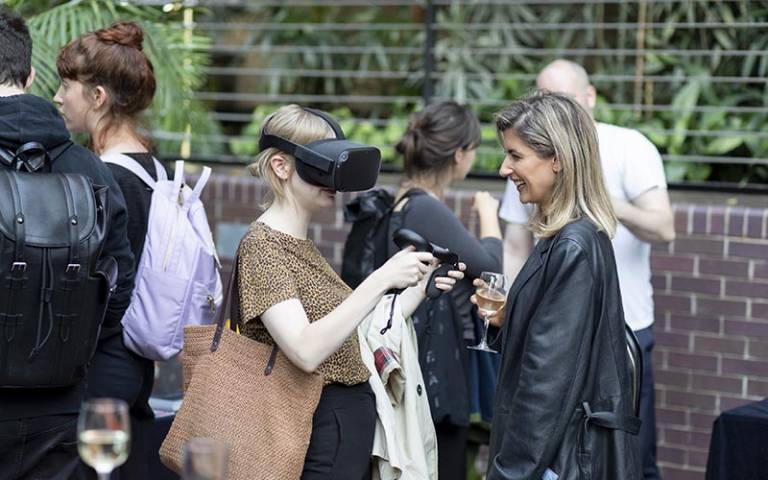UCL and creative partners debate art futures through twin events
15 October 2019
September’s AI and art futures symposium saw opinion leaders across the art world engage in stimulating debate, helping set the scene for November’s Future of the art market unconference.

UCL Innovation & Enterprise led the inaugural 'AI and art futures symposium' on 12 September 2019, hosted at the Barbican Centre in London and supported by Arts Council England. Among the key event partners were Creative United, Vastari, UCL Engineering, UCL Laws and the Slade School of Fine Art.
UCL Innovation & Enterprise works with UCL’s thriving community of artists, engineers, clinicians and scientists, together with businesses, charities and creative organisations. The aim is develop impactful collaborative projects and exciting events.
The one-day event at the Barbican brought together leading international speakers as well as dynamic companies and startups from a broad spectrum of disciplines. Discussions spanned historical and emergent digital arts practice, art market trends, and data-driven innovation for makers and public and private audiences.
An exciting prototype lab also offered a space to test and share emerging content and concepts from industry and academia.
Historical perspectives
Professor Chris Salter, Artist and Professor of Computation Arts at Concordia University, introduced the morning’s proceedings:
“Contrary to popular belief, the discussion about how AI will impact not only the arts but creative practice in general is not something out of the blue but has very deep historical roots. The Slade School at UCL is one of the places where interest in thinking about AI and the arts took early roots: in 1972, Malcolm Hughes founded the Computer and Experimental Department at the Slade.”
Panel discussions followed, starting with how democratisation of art is challenging art markets, chaired by Adriano Picinati di Torcello, Director, Deloitte Art and Finance. Technological advances and the experience of art were also discussed, chaired by Simon Cane, Executive Director, UCL Culture.
Unique insight into art futures
Opening the afternoon’s proceedings, Tonya Nelson, Director of Arts Technology and Innovation at Arts Council England, gave some valuable insights into her organisation’s 10-year strategy in supporting the creative sector.
“My role really is about content: thinking about who the artists of the future are going to be, how they are going to make work, how digital technology is going to affect the way that they make their work. But also thinking about existing artists and arts organisations and how they can use digital technologies to create new experiences.”
Speakers sessions, panel discussions and Q&As followed. Topics included whether blockchain will save art, ‘materialising the digital: (almost) fifty years of computers and experiment at the Slade’ and digital futures, materiality and added value.
Natalie Kane, Curator of Digital Design at the V&A, closed proceedings with some unique insight into her fascinating role:
“For me personally as a collector and curator of this work, I’m interested in that interface between design and society: what AI, neural networks and machine learning are doing to our understanding of designed objects and the designed sense of our world and the way in which we exist. It kind of becomes an act of philosophy in that way.”
Future of the art market unconference
One of the key partners from the September symposium, Creative United, will lead an event in collaboration with UCL on 13 November at Somerset House, London.
The 'Future of the art market unconference' will explore what the UK contemporary art market might look like in 2030.
Unlike a conventional conference with panel discussions and presentations, an unconference is a collaborative, crowd-sourced event focused on proactive debate and interactivity.
Delegates will be invited to take an active role in shaping the day’s agenda, which is expected to focus on topics such as:
- Will blockchain enable new distribution models for art?
- What is the role of the art gallery in a world where artists can sell art directly via social media?
- Do brand collaborations undermine artistic credibility?
- In the future, will artists’ careers become more or less sustainable as a result of technology?
To coincide with the unconference event, a new report will be published by Creative United. It will examine significant changes in the contemporary art market over the past 15 years and explore the dominant issues and trends likely to have an impact on the size and shape of the market in decades to come.
Go to the unconference website for further information and to pre-register for a copy of the report (due for digital release on Tuesday 12 November 2019).
Tickets for the unconference are available via Eventbrite.
Links
Find out more about:
Photo taken by Thomas Jenkins at the AI and Art Futures Symposium
 Close
Close

